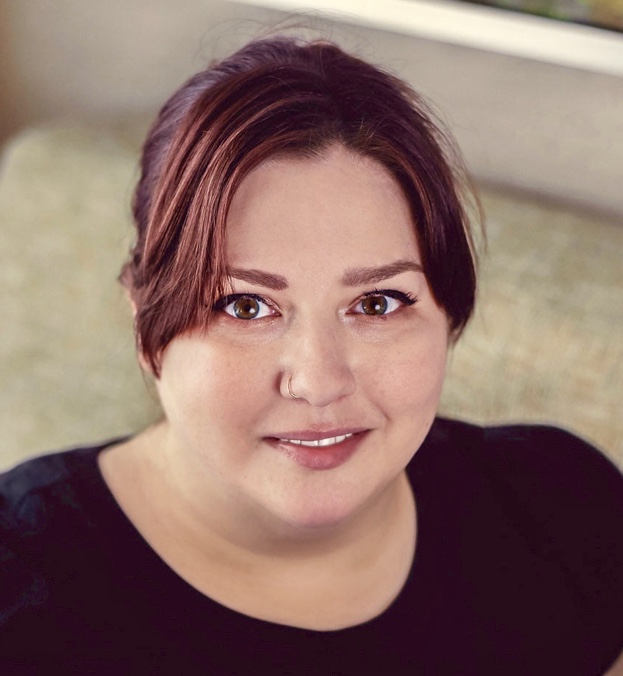
Conversations:
Krystal, hi. Thanks so much for talking to conversations today. First, let me ask, what is endometriosis? Many people have heard of it but don’t know it especially men!
Krystal Beasley:
Endometriosis is a condition where foreign tissue grows that mimics uterine tissues on the reproductive organs and close by organs like the bladder, bowels but it can grow anywhere including the brain. It causes internal bleeding, organ damage and extreme chronic pain.
Conversations:
Take us back to the beginning, Krystal. How were you feeling BEFORE you were diagnosed with endometriosis?
Krystal Beasley:
I actually had symptoms as a child. I started my period early, age 9. My periods were more painful them everyone else’s it seemed and I was bleeding heavily and for weeks on end. In high school my mom has to pick me up a lot from school. I was put on birth control to regulate my period but no one ever suggested Endometriosis. In my 20s I had mild flare up but they didn’t last long and were so foreign, I couldn’t describe the pain or figure out where it was originating from so I didn’t say anything. In the summer of 2016, I was 29, and just collapsed one day from the pain. I went to the ER and was told it was everything from a kidney stone they couldn’t find to needing to empty my bowels. Again, no one suggested Endometriosis.
Conversations:
So you still didn’t get a diagnosis despite suffering from this for decades?!
How / with whom did you finally get properly diagnosed?
What were doctors telling you they thought it was . . . during those years?
Krystal Beasley:
I didn’t. Had I known what Endometriosis was, I feel like I wouldn’t have been able to connect the dots and go to my doctor and say I think I have this. I actually didn’t bring it up in my twenties and earlier. My primary thought I had PCOS and did testing for that but tests were negative.
I spent from July 2016 to January 2017 in and out of the ER. I tried going to different hospitals in the area hoping for a different answer but it was “it’s a kidney stone” or I needed to empty my bowels more. I met with my urologist and he confirmed there wasn’t a kidney or any infections. I was suffered for months, I was finishing the last semester at school, I had to take leave of absence because of another condition I have, and I was collapsing constantly on campus. I don’t know how I made it though. The last time I went to the ER before my diagnosis they found a small cyst on one of my ovaries and told me this was the problem and to call my gynecologist. They sent everything to my gynecologist and when I went to see him, he said there’s no way that cyst is calling this much pain. He said the word Endometriosis and said he wanted to do a biopsy. He did the biopsy a week before my 30th birthday and called me the day before, the 13th, and told me that I had Endometriosis and he needed to do surgery as soon as possible. My first surgery was scheduled April 1st, 2017.
The thing is my gynecologist IS an endometriosis specialist and had I been told what endometriosis was I truly believe that I wouldn’t have end stage Endometriosis, that maybe if they caught it at a stage 1 or 2 I wouldn’t be as sick as I am.
Conversations:
I am trying to digest this horrific story. I infer until the cyst, you had no idea it was reproductive related . . . it wasn’t until then, that there was a certain focus on uterine, ovarian, related . . . .?
Krystal Beasley:
When I had my first surgery endometriosis was found on my ovaries, on my uterus, Fallopian tubes, my bowels and my kidneys. So, I was feeling digested issues, I did see a GI doctor who had no answers for me in my late 20s. The pain I was having was in my pelvis and abdominal area so it was hard to pinpoint its origin. I really thought it was digestive, which makes sense because my bowels were so damaged. Endometriosis is thought to be a reproductive disease and it surely affects the productive organs as well as fertility but in reality, it affects the entire body. My endometriosis has spread since my first surgery.
Conversations:
Where has it spread to and how does it manifest itself? You mention you have had surgery? Are there other treatment options?
Krystal Beasley:
I’ve had three excision surgery’s so far. My second one was September 15th, 2018 and that was considered a failure, I started bleeding a month later and bled externally as well as internally for four months straight. It was decided I’d have my third surgery March 6th if 2019. Unfortunately, my doctor was having his own medical issues and I couldn’t wait so I decided to go with another surgeon. This surgery did robotic excision. Which is more invasive and I was hoping would help more. But I was told after my first surgery they only thing my doctor could offer me was surgery and pain meds. There are two drugs that they use for endometriosis, Lupron and Orilissa. Lupron is chemotherapy and Orilissa works similar but isn’t considered chemotherapy. The endometriosis community as a whole has very little relief from these drugs and the drugs themselves carry significant side effects and are long term. None of these options cure endometriosis. Usually excision is only needed once but if it is deep infill (DIE Endometriosis), super aggressive or on organs they can’t safely operate it will continue to spread. I say surgery is treatment. It isn’t curing my Endometriosis but it is the difference between me being able to walk and function, it gives me some quality of life.
Right now, the Endometriosis is/has on my ovary, bowels, Fallopian tube, bladder, kidneys, liver, stomach, and diaphragm. My last surgery was August 2019 and my doctor had to remove my left ovary. It was so damaged he couldn’t repair it. At my follow up after being more concerned with whether I could one day conceive and angry with him for removing my ovary I was told that his main concern was prolonging organ failure. Between my two surgeons who are specialist and the best of the best, they both said I have one of the worst cases they have ever seen. During my third surgery 90% of my Endometriosis was removed, 10% of it is in places they cannot safely operate. It has always come back more aggressive with each surgery and continues to spread.
Conversations:
This sounds very scary, Krystal. Do you know if there are any treatments in the pipeline? That are in trials? In development?
Krystal Beasley:
Not that aware of, they don’t have a concrete understanding of what causes it. I think once they do they can start to develop new treatments. They believe our micro phage in the blood has to do with it, those with endometriosis have mutated micro phage. They have also found it in aborted fetuses which points to it can possibly be passed down genetically. There is no one in my family that has Endometriosis. I have talked to mothers who are seeing the symptoms in their daughters. What’s working for me is continuous birth control so I don’t get my period. After my third surgery that was a struggle as the hormones I had always used stopped working and it took two months to get the bleeding under control and pain management. I am currently in pain management and do take oxycodone daily. As little as this disease is talked about, what’s talked about even less is the chronic pain associated with it and due to the pain, the high suicide rate and lack of pain management, I’m one of the lucky ones.
Conversations:
Krystal, I want to revisit and recap the symptoms you had . . . can you give me a laundry list for other women to be aware of . . . if you have one or more of these symptoms, you could have endometriosis . . .
Krystal Beasley:
Sure! Heavy or irregular periods as well as bleeding in between periods. Usually, pain is felt during periods but when Endometriosis progresses many experience pain that is outside of their periods. Periods are uncomfortable but if you are in so much pain you have to call off from work or are throwing up or getting disoriented from the pain, something isn’t right. Other symptoms to look for are GI issues, migraines and severe bloating. A lot of times women are diagnosed with GI disorders when it’s Endometriosis on the bowels. Pain with intercourse, ongoing fatigue and issues with fertility are also signs to look for.
Conversations:
I know you’re doing a lot in awareness and advocacy in endometriosis . . . tell CONVERSATIONS about your efforts there . . .
Krystal Beasley:
Also, things to look for in young girls would be an early period as well as developing early, as Endometriosis is an estrogen dominate disease.
First and foremost, when I was diagnosed, I did continuous research on Endometriosis. I realized early that Endometriosis is very much misunderstood even in the medical community. In August 2019 I was approached to become a peer for Endometriosis Crisis Connection and shortly after a Director and Partner. With speaking with others in the community I have found that many doctors are not keeping up with the newest information about Endometriosis and this is causing gynecologists to treat Endometriosis using outdated surgery (ablation) or preforming total hysterectomies. They will then tell their patient they are cure and send them on their way. We have very few specialists, about 200 that perform Excision surgery. I was working with a young woman whose gynecologist performed a full hysterectomy on her. Inside of using less invasive laparoscopy surgery my client was cut from hip to hip. She is continuing to have problems but her doctor, like many other, believe Endometriosis to be solely a reproductive disease and feel of all the reproductive organs are removed the Endometriosis will go away. A specialist will tell you that Endometriosis will make its on Estrogen like hormones to continue to spread.
Along with advocating for proper treatment pain management is also something my clients struggle with. I am fortunate to be in a pain management program however, due to the Opioid crisis chronic pain patients are being turned away. This has caused a huge rate of suicide in the Endometriosis community. After a while, the pain becomes too much. This is why Endometriosis Crisis Connection was created, we took a poll and 90% of the women we polled said they have at one point contemplated suicide, myself include. To say the pain felt by endometriosis is sheer torture is not an exaggeration.
Conversations:
You’re one of the founding members of the Endometriosis Crisis Connection? Do you have a website? Tell me more about it . . . what are your goals there?
Krystal Beasley:
Endometriosis Crisis Connection was founded by Jojo Higgs. We have four partners; Angie Corbett, Breanna Romaine-Guiliano, Jojo and I. We currently are building our website and are operating on Facebook.
Conversations:
And you are a resource for women in need . . . who have support needs . . . they can message, email, call for support?
Krystal Beasley:
Yes, anyone woman suffering from endometriosis can message our Facebook page for immediate assistance. Usually, they just need validation or need to vent. We offer advice and educate them. Some have just been diagnosed and others just need some guidance or suggestions on how to talk to their doctors. We also get a lot of clients reaching out because they are scheduled for surgery. We are able to go through what will happen during surgery, make sure they have what they need and offer encouragement. We have helped link clients with specialist and we have also worked with local emergency personnel and crisis services for suicidal clients. Right now, it’s tailored to each client.
Angie and I are working on an ongoing peer coaching program so we can provide a weekly coaching session for our clients that are interested. As we found this is needed after a crisis. Many of our clients struggle with positive and helpful support systems. Endometriosis on a large scale isn’t a disease that is taken seriously or is deemed a serious medical condition. Many don’t realize that Endometriosis effects every aspect of a sufferer’s life. It isn’t just a bad period as people often say.
Conversations:
Do you have a link to your Facebook page so people can easily find you?
Krystal Beasley:
Yes, https://m.facebook.com/endometriosis.crisis.connection. Once our website is completely up and running will we announce it via Facebook.
Conversations:
Thank you. And separately, you have your own blog page. Tell us what you’re doing with that. And share a link to it . . .
Krystal Beasley:
Yes, before joined Endometriosis Crisis Connection I started Stage4endochick. It started as a Facebook page and now I have a website. I started writing blog posts to educate those with Endometriosis as well as those who don’t have it but maybe has a loved one suffering from it. I will be started a YouTube channel as well. When my last surgery was pushed back months, I had to put everything on hold as I barely was able to work. What sparked Stage4endochick was my ex-boyfriend wasn’t at all supportive and I actually searched for a video on YouTube to show him what it’s really like to have Endometriosis, unfortunately I couldn’t find one. My website is www.krystalbeasley.com. Because I am also a reiki master and life coach. I needed a website to house everything. But anyone looking for more information regarding stage4endochick will find it there.
Conversations:
Great. That you’re so involved . . . I want to ask you about being a Reiki coach. For those, that don’t know, can you explain what that is . . .
Krystal Beasley:
Yes, reiki is a form of energy healing where those attuned to the energy can do healings on others. Reiki goes where it needs to but will provide short term pain relief, relaxation, anxiety, mental clarity, increases energy, help strengthen, helps with fatigue and for those are spiritual, if can help strengthen their spiritual connection.
I’m also a life purpose coach and have worked with clients in finding their life purpose as well as individual spiritual coaching. Which is very individualized.
I am working on some online courses, one in particular i will be combining my knowledge of reiki, relaxation, meditation and EFT/TFT (Tapping meridian point on the body to release blocked energy) to offer a course for those with Endometriosis (and other chronic pain suffers). This course would be a special course focusing on pain management and would an level I attunement. In Reiki I the focus is self healing.
Conversations:
That’s impressive and inspiring, Krystal. How is the course being distributed? Is it affiliated with another entity?
Krystal Beasley:
Thank you. I will be using CourseCraft as I’ve used that platform for other courses I’ve created in the past and it’s extremely user friendly. The course will be accessible through my website. I’m hoping to have it done this Spring.
Conversations:
That’s so exciting.
Krystal, you have been so generous with your time. Thanks so much speaking with CONVERSATIONS.














